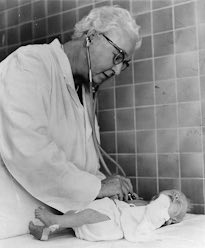Virginia Apgar, brilliant physician and humanitarian, is best known for her development of the Apgar Score (1952), a system to determine whether a newborn infant needs special attention to stay alive. In most births at the time, attention was focused on mothers, not the newborns, which resulted in many infant deaths. This simple test, performed in the very first minutes of a baby’s life, measures an infant’s pulse, skin color, activity and respiration very quickly, enabling medical staff to intervene if help is needed. This simple but brilliantly conceived examination has saved countless newborn lives.
Apgar, one of the few women admitted to Columbia University College of Physicians and Surgeons in the 1930s, trained first in surgery, but shifted her work to anesthesiology, a new field that offered the opportunity to do groundbreaking work. She was soon named director of anesthesiology at Columbia, the first woman to head a department at the University. In 1949, after she built a major academic department in the discipline, she was named the first full professor of anesthesiology – the first woman to hold a full professorship in any discipline at Columbia University.
Apgar’s career shifted again in 1959 when she became a senior executive with the National Foundation March of Dimes, and spent her time working to generate public support and funds for research on birth defects. She was a spectacular fundraiser and educator of the public, and greatly increased both visibility and attention paid to the problems of birth defects.
In 1973, she became the first woman to receive the Gold Medal for Distinguished Achievement in Medicine from the College of Physicians and Surgeons, Columbia University. In 1994 Apgar was pictured on a U.S. postage stamp as part of the Great Americans series.

